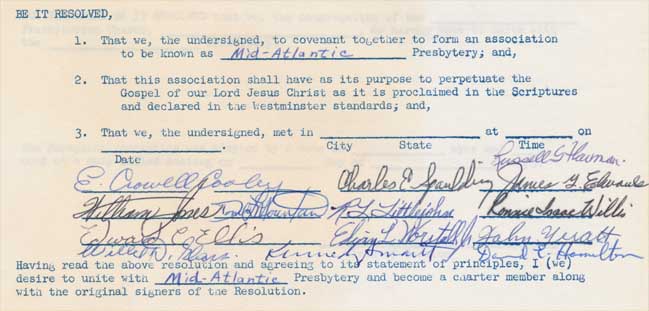Rights of Particular Churches in Relation to the Denomination and its Courts.
This day, October 30, marks the anniversary of the organizational meeting of the Mid-Atlantic Presbytery (PCA). As you will remember, the denomination itself did not meet in General Assembly until December 4-7 of 1973. However, several Presbyteries were formed in advance of the official founding of the denomination. The first of these, as evidenced by its name, was the Vanguard Presbytery, organized on September 7, 1972. The churches comprising Vanguard Presbytery eventually merged into other Presbyteries and Vanguard was dissolved in March of 1977. In addition to Vanguard, there were another thirteen Presbyteries organized in advance of the official founding of the PCA. Mid-Atlantic Presbytery was the last to organize prior to the First General Assembly
1. Warrior – 13 February 1973
2. Gulf Coast – 10 April 1973
3. Westminster – 10 April 1973
4. Central Georgia – 30 May 1973
5. North Georgia – 2 June 1973 [dissolved by division and continued by Metro Atlanta Presbytery]
6. Southern Florida – 4 Jun3 1973
7. Covenant – 18 June 1973
8. Calvary – 1 July 1973
9. Grace – 17 July 1973
10. Mississippi Valley – 19 July 1973
11. Texas – 31 July 1973 – [dissolved by division and continued by North Texas Presbytery]
12. Evangel – 5 August 1973
13. Mid-Atlantic – 30 October 1973 – [dissolved by division and continued by James River Presbytery]
As these Presbyteries and their churches organized, they met as Presbyteries of “The Continuing Presbyterian Church,” that being the working name of the new denomination prior to its official organization. What follows are a few highlights from the Minutes of the organizational meeting of the Mid-Atlantic Presbytery:—
WHEREAS, we, the undersigned, are agreed that the Scriptures of the Old and New Testaments are the Word of God, the only infallible rule of faith and practice; and,
WHEREAS, we are agreed that the Westminster Confession of Faith (in the edition published in 1973 by the Steering Committee for a Continuing Presbyterian Church) and the Westminster Larger and Shorter Catechisms set forth the system of doctrine taught in the Holy Scriptures; and
WHEREAS, we are agreed that the mission of the Church has been given her by the Lord Jesus Christ, the Head of the Church, and is to make disciples of all nations and to teach them all things whatsoever He has commanded; and,
WHEREAS, The Book of Church Order (in the revised 1933 edition published in 1973 by the Steering Committee for a Continuing Presbyterian Church) sets forth a reasonable and practical formulary for church organization (although we do not regard the quota of three ministers necessary for a quorum of presbytery to be in effect until there are at least four minister members of our presbytery); and,
WHEREAS, the appended statement “Rights of Particular Churches in Relation to the Denomination and Its Courts” is adopted by us as setting forth priniciples of Presbyterian government essential to our agreement, therefore,
BE IT RESOLVED,
1. That we, the undersigned, to covenant together to form an association to be known as Mid-Atlantic Presbytery; and,
2. That this association shall have as its purpose to perpetuate the Gospel of our Lord Jesus Christ as it is proclaimed in the Scriptures and declared in the Westminster standards; and,
3. That we, the undersigned, met in Hopewell, Virginia at 11:00 A.M. on October 30, 1973.
Rights of Particular Churches in Relation to the Denomination and its Courts.
a. The corporation of a particular church, through its duly elected trustees or corporation officers, (or, if unincorporated, through those who are entitled to represent the particular church in matters related to real property) shall have sold title to its real property, and shall be sole owner of any equity it may have in any real estate. No superior court, as such, shall have any claim whatsoever upon any real property or any equity in any real estate, or any fund or property of any kind by or belonging to any particular church, or any board, society, committee, Sunday School, class or branch thereof. The superior courts of the church may receive monies or properties from a local church only by free and voluntary action of the latter.
b. All particular churches shall be entitled to hold, own, and enjoy their own local properties, without any right of revision whatsoever to any presbytery, synod, or any other courts hereafter created, its trustees or other— officers.
c. The provisions of this chapter are to be construed as a solemn covenant whereby the Church as a whole promises never to attempt to secure possession of the property of any congregation against its will, whether or not such congregation remains within or chooses to withdraw from its body. All officers and courts of the Church are hereby prohibited from making any such attempt. The intent of the provisions of this section are unamendable and irrevocable.
d. Particular churches need remain in association with Presbytery, synod, or any other courts hereafter created, only so long as they themselves so desire. The relationship is voluntary, based only upon mutual love and confidence, and is in no sense to be maintained by the exercise of any kind of force or coercion whatsoever. A particular church may withdraw from its presbytery, synod, or any other court hereafter created, at any time for reasons which seem to it sufficient, by orderly ballot at a legal meeting of its congregation or corporation. A simple majority of those present and voting shall decide the issue.
———
With some further changes, the principles of the above text was subsequently incorporated into the Book of Church Order of the Presbyterian Church in America, as part of BCO Chapter 25.
A Question to Ponder:
While the above provision is a wise one, can you offer a Scriptural defense for this provision? (I’m seeking wiser minds here)

